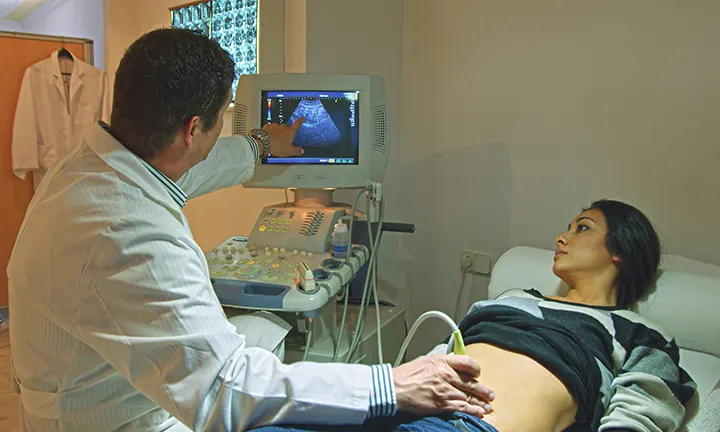What Is an Ectopic Pregnancy? Signs, Causes, and Medical Care
While ectopic pregnancies are relatively rare, they do require prompt medical attention if they occur. Understanding the signs of ectopic pregnancy may be essential. Here, we’ll explore what an ectopic pregnancy is, the common signs and symptoms of ectopic pregnancy, potential risk factors, and the treatment options your healthcare provider may recommend.
What Is an Ectopic Pregnancy?
In a typical pregnancy that develops normally, a fertilized egg moves through the fallopian tube toward the uterus, where it implants and starts to grow. So, what is the definition of an ectopic pregnancy and what happens in this type of pregnancy? In an ectopic pregnancy, the fertilized egg implants outside of the uterus. In more than 90 percent of ectopic pregnancies, the fertilized egg attaches itself to the wall of the fallopian tube. This condition is called a tubal ectopic pregnancy. Occasionally the egg implants in the ovary, cervix, or abdominal cavity. Only the uterus can hold a growing embryo, so in these other cases, the pregnancy cannot progress.
A tubal ectopic pregnancy can cause the fallopian tube to burst, resulting in internal bleeding. This requires emergency medical treatment, as it can be life-threatening.
Sometimes you might hear terms like “extrauterine” and “intrauterine.” Extrauterine pregnancy is another name for ectopic pregnancy, and intrauterine pregnancy refers to the fertilized egg implanting normally in the lining of the uterus.
For women who got pregnant via in vitro fertilization (IVF), there is a 1 percent chance of what is called a heterotopic pregnancy. This is when an intrauterine pregnancy occurs at the same time as an ectopic pregnancy. For women who got pregnant naturally, the risk of this is much lower and is estimated to range from 1 in 4,000 to 1 in 30,000.
How Common Is Ectopic Pregnancy?
Ectopic pregnancies are quite rare, making up just 2 percent of pregnancies. The most common type of ectopic pregnancy is tubal ectopic pregnancy.
What Causes an Ectopic Pregnancy?
Ectopic pregnancy happens when the fertilized egg cannot make its way down the fallopian tube to the uterus. This could be a result of scar tissue on the fallopian tube from a past surgery, which blocks the egg’s path to the uterus. Other potential factors that may play a role include an abnormal shape or an inflammation of the fallopian tube, abnormal development of the fertilized egg, or hormonal imbalances.
Does Ectopic Pregnancy Show on a Pregnancy Test?
If you take a pregnancy test with an ectopic pregnancy, the test may be positive. This is because many pregnancy tests work by checking for the hormone hCG levels in an ectopic pregnancy (the pregnancy hormone), so a test may pick up hCG until the ectopic pregnancy is fully treated.
Ectopic Pregnancy Symptoms
It can be difficult to recognize the signs and symptoms because they can start very early in your pregnancy—at a time when you might not know you are pregnant yet. In addition, some of the indicators are also typical early signs of pregnancy.
Although the risk of ectopic pregnancy is low, it helps to be aware of the early symptoms, which can include:
Abnormal vaginal bleeding. Bleeding in early pregnancy can also be implantation bleeding, so consult your healthcare provider.
Lower back pain
Mild pain or cramping in the abdomen or pelvis
Feeling dizzy or weak.
Early Signs of Ectopic Pregnancy
Early signs and symptoms of ectopic pregnancy may feel similar to typical pregnancy symptoms in the first trimester, such as a missed period, nausea and/or vomiting, commonly known as morning sickness, and breast tenderness. This can make it difficult to spot ectopic pregnancy early on. However, if you experience any of the symptoms listed above (vaginal bleeding or pelvic pain), contact your healthcare provider.
Ruptured Ectopic Pregnancy Symptoms
If your ectopic pregnancy progresses, it could lead to a rupture in the fallopian tube. This can be very serious and requires immediate medical attention. You should contact your healthcare provider right away or go straight to the emergency room if you notice:
A sharp pain in the pelvis, abdomen, or shoulder
Weakness, dizziness, or fainting. Feeling dizzy or light-headed may be caused by internal bleeding due to a ruptured fallopian tube.
Keep in mind that your healthcare provider is the right person to make a diagnosis.
Ectopic Pregnancy Risk Factors
Although about half of all pregnant people who have an ectopic pregnancy don’t have any of these risk factors, the chance is higher if
you’ve had an ectopic pregnancy before
you’ve had surgery on a fallopian tube, or on other areas of your pelvis or abdomen
you’ve had certain sexually transmitted infections
you’ve had pelvic inflammatory disease
you have endometriosis.
Other factors that may increase your risk of ectopic pregnancy include if
you’re more than 35 years old
you have a history of infertility
you smoke.
Ectopic Pregnancy Diagnosis
Your healthcare provider can make a diagnosis for ectopic pregnancy using an ultrasound to see where the pregnancy is developing and/or a blood test to measure levels of the pregnancy hormone hCG. The results may not be clear right away, so you may need another test a few days later. In some cases, your provider may notice the ectopic pregnancy during your first pregnancy scan.
Ectopic Pregnancy Treatment
An ectopic pregnancy cannot move itself or be moved to the uterus, and it can’t continue to progress anywhere but in the uterus. That’s why your healthcare provider will likely treat your ectopic pregnancy by ending the pregnancy either by surgery or by medication. Your provider will explain which option is best for you.
Medication: Methotrexate for Ectopic Pregnancy
For an ectopic pregnancy, the most common drug used is methotrexate. This medication stops the cells of the embryo from growing, which ends the pregnancy. Then, over about four to six weeks, your body absorbs the pregnancy tissue. The benefit of this option is that the affected fallopian tube may not need to be removed, and you may be able to avoid surgery.
This option may be recommended if the fallopian tube has not ruptured, and if you’re able to return for regular blood tests to check your hCG levels until it is no longer found in your blood. This option may not be available or advisable if you’re breastfeeding or have certain health issues.
Methotrexate may be given in one or more doses. The risk of fallopian tube rupture with ectopic pregnancy only goes away once treatment is complete, so if you develop symptoms such as sharp abdominal or shoulder pain, or feeling faint or weak, seek medical help right away, as these are potential signs of internal bleeding resulting from a rupture. Side effects of methotrexate may include nausea, vomiting, and vaginal bleeding or spotting.
During treatment and until your provider gives you the all-clear, it's best to avoid heavy exercise, taking vitamins and foods containing folic acid, taking anti-inflammatories like ibuprofen, having sex, and prolonged exposure to the sun.
Ectopic Pregnancy Surgery
If a fallopian tube has ruptured, emergency surgery is needed, but sometimes surgery may be needed even if a tube hasn’t burst. The ectopic pregnancy may be removed from the tube leaving the tube in place, or the tube—together with the pregnancy tissue—may be removed. Typically, laparoscopic surgery is chosen. This involves small incisions being made in your abdomen while you’re under a general anesthetic. During surgery, the pregnancy tissue is removed, and the affected tube is repaired or removed.
In a smaller number of cases, a larger incision of the abdomen may be required, usually in cases where the pregnancy is further along, or if a rupture of the fallopian tube is suspected.
Your healthcare provider will recommend a course of treatment and explain all the risks and side effects, which can include bleeding and infection following surgery. After surgery, follow-up care is required, and your provider will closely monitor your recovery, including rechecking your hCG level to make sure the ectopic tissue has been completely removed.
How to Avoid an Ectopic Pregnancy
You can’t prevent an ectopic pregnancy from occurring; however, there are a few ways that may help reduce your risk. Maintaining a healthy lifestyle and quitting smoking may help, as well as protecting yourself from sexually transmitted infections.
If you’re planning to get pregnant and have some risk factors for ectopic pregnancy, consult your healthcare provider for more advice.
Getting Emotional Support
It’s completely natural to feel anxiety, fear, or grief at this time, even if you only knew you were pregnant for a short while. The treatment itself can also cause you to feel tired or as if you are still pregnant, which can compound the feelings you may have. You might find counselling helpful, or you can seek support in online forums where you’ll find other people who’ve had a similar experience. Reach out to your loved ones for extra support. It might help to give yourself extra time to rest and recuperate after the treatment, too, so you can recover physically and come to terms with what you’ve been through.
FAQS AT A GLANCE
No, your belly does not typically grow with an ectopic pregnancy. Instead of developing in the uterus, the fertilized egg implants and grows outside the uterus, often in the fallopian tube. This can cause symptoms such as pelvic pain, vaginal bleeding, and in some cases, shoulder pain or dizziness due to internal bleeding.
The Bottom Line
Ectopic pregnancies are relatively rare, but if you notice any of the symptoms mentioned in this article, such as low back or pelvic pain or abnormal vaginal bleeding, consult your healthcare provider for reassurance and advice. If you are diagnosed with an ectopic pregnancy, your provider will discuss your treatment options with you.
For more support during your pregnancy journey, consider joining the Pampers Rewards App to access resources, rewards, and tips tailored to you.
How We Wrote this Article The information in this article is based on expert advice found in trusted medical and government sources, such as the American Academy of Pediatrics and the American College of Obstetricians and Gynecologists. You can find a full list of sources used for this article below. The content on this page should not replace professional medical advice. Always consult medical professionals for full diagnosis and treatment.
Join Pampers Club and get:





